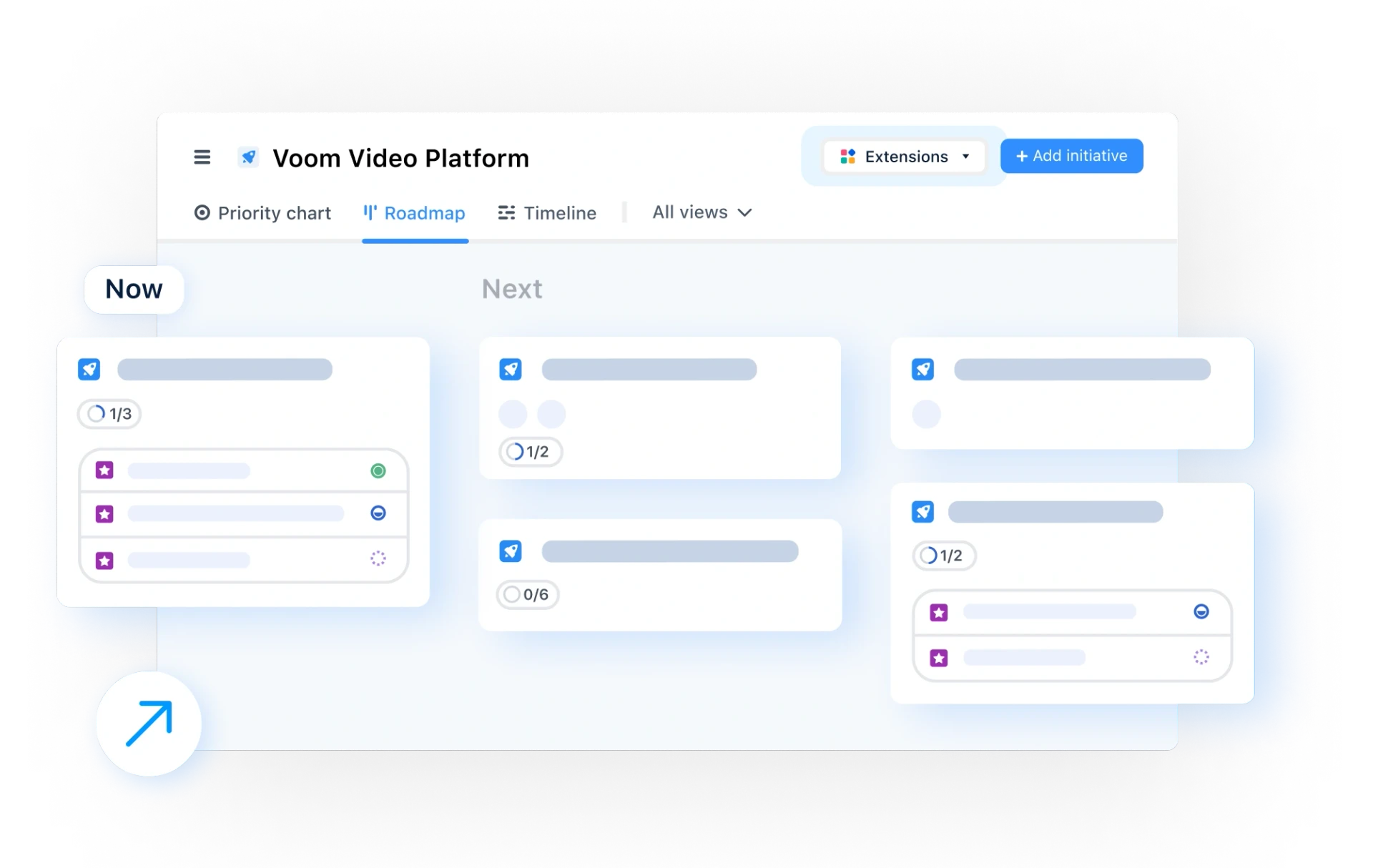Innovation Roadmap
What is an innovation roadmap?
Innovation roadmap definition
An innovation roadmap is a visualization of how a business will implement an innovation strategy. The map lays out the strategic objectives, go-to-market plans, and organized tasks that will empower employees to promote and support the new endeavor.
Teams may use an innovation roadmap to plan product extensions, develop a new internal software solution with R&D, explore new means of competitive advantage, and more.
Innovation is something that every successful business has to undertake. But many set off on innovation projects just for innovation’s sake. The purpose of an innovation roadmap is to plan a blueprint for what you are innovating, why, and how it will come together. When used well, an innovation roadmap can reduce risk, achieve team-wide buy-in, and align all collaborators to make innovation projects a success.
Why is an innovation roadmap important?
An innovation roadmap helps you:
Build a competitive advantage and plan your market differentiation
One of the key reasons to invest in an innovation roadmap is that it can help you establish your business's competitive advantage. After all, innovation, for innovation's sake, can be exciting for a product team, but it's not necessarily practical for the growth of your business.
Creating an innovation roadmap will help you establish what you are creating and why. It's also an opportunity to plan out your market differentiation.
By building up these two factors early in the development phase, you can create security around the success of your innovative product or service.
Steer and implement your initial innovation management
Innovation roadmaps help your business steer its initial innovation management. This is generally one of the most exciting phases of the development process.
However, steering that excitement in a productive, cohesive direction can be challenging without a roadmap. Using an innovation roadmap will help you establish specific steps and goals to follow.
Additionally, using an innovation roadmap to hit your milestones can help you implement the results of that progress. You and your team will better understand when and how to put your work into action.
Stay focused on the most promising opportunities
You can use an innovation roadmap to help you spot the most promising opportunities that come your way. Throughout the development of an innovative product or service, you will no doubt encounter offers, ideas, or tools that have the potential to benefit your strategy.
That doesn't necessarily mean, though, that you should leap at every opportunity. They might end up slowing you down, costing you valuable resources, or simply not fitting into your overall plan as well as you initially thought.
Roadmapping can help you evaluate opportunities as they arrive, giving you solid metrics for determining the value and importance of each one.
Innovation roadmap ideas and examples
Most product teams will be familiar with roadmapping in one way or another, but you may not have created an innovation roadmap before. In the next section, we’ll walk through the steps required to do so, but here are our top tips for innovation roadmaps in general (plus a few examples).
Look backward before you look forward. It might sound jarring, but before you can plan any innovation you need to learn from what’s happened in the past. When and how have other innovation projects been a success? When and how have they failed?
Set your goals. Goals are essential for an innovation roadmap. What are you hoping to innovate and what will that look like? Set out milestones with specific goals or achievements before you put a timeline together.
Be ready for obstacles. 60-80% of new products fail, and internal innovation activities are far from guaranteed to succeed. What could get in the way of your plan? And how can you structure your roadmap to be adaptable to change?
For examples of great innovation roadmaps, take a look here.
How to make an innovation roadmap
Now that you know the value an innovation roadmap can bring, you’re probably asking: How do I make an innovation roadmap?
Simply follow these steps…
Define your objectives and purpose - as we said above, goals are everything in innovation. What do you want to achieve, by when, and who will be involved?
Analyze the landscape - perform an in-depth investigation of potential risks, opportunities, trends, team competencies, and any other elements that could support or derail your success. You could interview employees, run a SWOT analysis, speak to users, and so on.
Set specific parameters - with all the research complete, you should have a better understanding of the project parameters.
Get management buy-in - before you go ‘live’ with the project and roadmap, it’s worth sharing the plan with senior leaders to get their approval or feedback. These colleagues are best placed to advise on whether your innovation goals are aligned with the wider organization.
Create and share your roadmap! Now you’re ready to visualize! Look no further than airfocus to create and then share your innovation roadmap with all the necessary stakeholders.
Innovation roadmapping with airfocus
The benefits of using airfocus for roadmapping
Fortunately, you don't have to start working on your innovation roadmaps alone. airfocus has plenty of resources to help you get started and stay organized. Our tools can help guide your team, giving you the focus and structure you need to succeed.
airfocus also provides several tools for agile teams, allowing you to tackle roadmapping from various angles. That way, if you find that innovation roadmaps aren't for your business, you can easily try a new approach.
Move fast with modularity features and preset templates
airfocus is completely modular. That means that your business only needs to invest in the tools and resources you need and nothing else. You can pick and choose the tools that will help you best succeed.
And with roadmap templates, you can move fast without compromising your organization or structure. Our templates will put you on the right track from the start.
General FAQ

Glossary categories
Build great roadmaps

Experience the new way of doing product management








